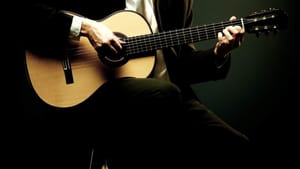Stay in the Loop
BSR publishes on a weekly schedule, with an email newsletter every Wednesday and Thursday morning. There’s no paywall, and subscribing is always free.
Soaring to the future of classical music
Philadelphia Chamber Music Society presents Jason Vieaux and Clancy Newman

Last week’s livestreamed Philadelphia Chamber Music Society recital by Grammy-winning classical guitarist Jason Vieaux and cellist Clancy Newman was much anticipated, as events that are cancelled and rescheduled often are.
The program of music by mostly Latin American and Spanish composers moved from blustery January to an unseasonably warm March evening. Thirty lucky music lovers, the maximum number allowed, attended this live performance at the American Philosophical Society’s Benjamin Franklin Hall (masks and social distancing measures in place), while a large audience tuned in at home via livestream.
Shimmering sound
And what an event it was. While it was Vieaux, one of the great classical guitar virtuosos of his generation, who drew me to this concert, Newman’s impassioned cello performances provided an additional incentive to savor every note.
The program opened with the Sonata for Guitar and Cello by Radamés Gnattali (1906-1988), a Brazilian composer of classical and popular music. Both musicians engaged in a lively partnership in this spirited music with an unmistakable South American beat. The imaginative second movement soared as both instruments explored Gnattali’s shimmering sound palette. The cello was unusually rich with dark chocolatey tones in counterpoint against the silky sound of Vieaux’s Gernot Wagner guitar. What a lovely voice echoed from that instrument, as though it were a living being.
The sonata ended with at times Flamenco fervor and several tricky glissandi on the cello which were punctuated by some abrupt strumming at the end.
“Chopin of the guitar”
Following a set of six popular songs by Manuel de Falla, Vieaux performed the Waltz in G Major, Op. 8, No. 4, for solo guitar by Paraguayan composer Agustín Barrios Mangoré, perhaps the most celebrated classical guitar composer of the 20th century (not to be confused with his contemporary also writing for classical guitar, Luciano Berio). In a comment before his performance, Vieaux pointed out the interesting arpeggiated campanella in the middle of the waltz and noted that many musicians consider Barrios “the Chopin of the guitar.”
Barrios’s music is not light, however, even in a dance form—at least not light in the sense of simple and obvious. Under Vieaux’s touch, this selection yielded a wealth of melodic interest and a level of complexity that at times made it seem as though there were two musicians playing at once. I loved the way notes flowed from the guitar, melting into each other so you cannot detect which passage is difficult and which floats away with ease. At times, the guitarist looked out into space as though taking a mental break from playing, and letting his fingers continue on their own. This is a marvelous work, a universe compressed into a short idyll, and one could not ask for a more delectable performance.
Rocking to the encore
The formal program concluded with the Suite No. 1 for Guitar and Cello by Italian composer Raffaele Bellafronte (born 1961). The composer’s interest in jazz and popular music is revealed throughout this energizing sampler in four movements. Here, cellist Newman shows the full range of what he can do, from the sweep of a lush, romantic opening to a hard-driving beat in the second movement, which in earlier comments Vieaux suggested might be influenced by King Crimson. Well known for his seamless mastery of jazz and rock idioms, Vieaux tapped vigorously on the soundboard which I trust was protected by some invisible plastic, and both musicians concluded the final movement, Tango, with soaring style.
No one was more surprised than I when Vieaux announced as their encore Led Zeppelin’s “Babe, I’m Gonna Leave You.” I spent a couple of hours of insomnia one night in the past week trying to remember the name of Robert Plant’s band. I could have just waited until Friday night when Vieaux made the announcement with what may have been a twinkle in his eye.
This amazing transcription and performance combined all the complexity and sensuality of the original song with the best qualities of classical wizardry. This is the best I’ve felt about the future of classical music in a long time. Thanks to musicians like Vieaux and Newman, barriers are being broken down, and music in all its dazzling forms is making its voice heard.
Image description: A photo of guitarist Jason Vieaux, a white man in his forties. He’s perched on a stool playing his guitar, wearing a black suit. The photo casts most of his face in a dramatic shadow and highlights his guitar.
What, When, Where
Philadelphia Chamber Music Society presents Jason Vieaux, classical guitar, and Clancy Newman, cello. Works by Radamés Gnattali, Manuel De Falla, Agustín Barrios Mangoré, and Raffaele Bellafronte. Livestreamed on March 26, 2021, from the American Philosophical Society’s Benjamin Franklin Hall, and available on demand for 72 hours thereafter (free, donations accepted). (215) 569-8080 or pcmsconcerts.org.
Sign up for our newsletter
All of the week's new articles, all in one place. Sign up for the free weekly BSR newsletters, and don't miss a conversation.

 Linda Holt
Linda Holt